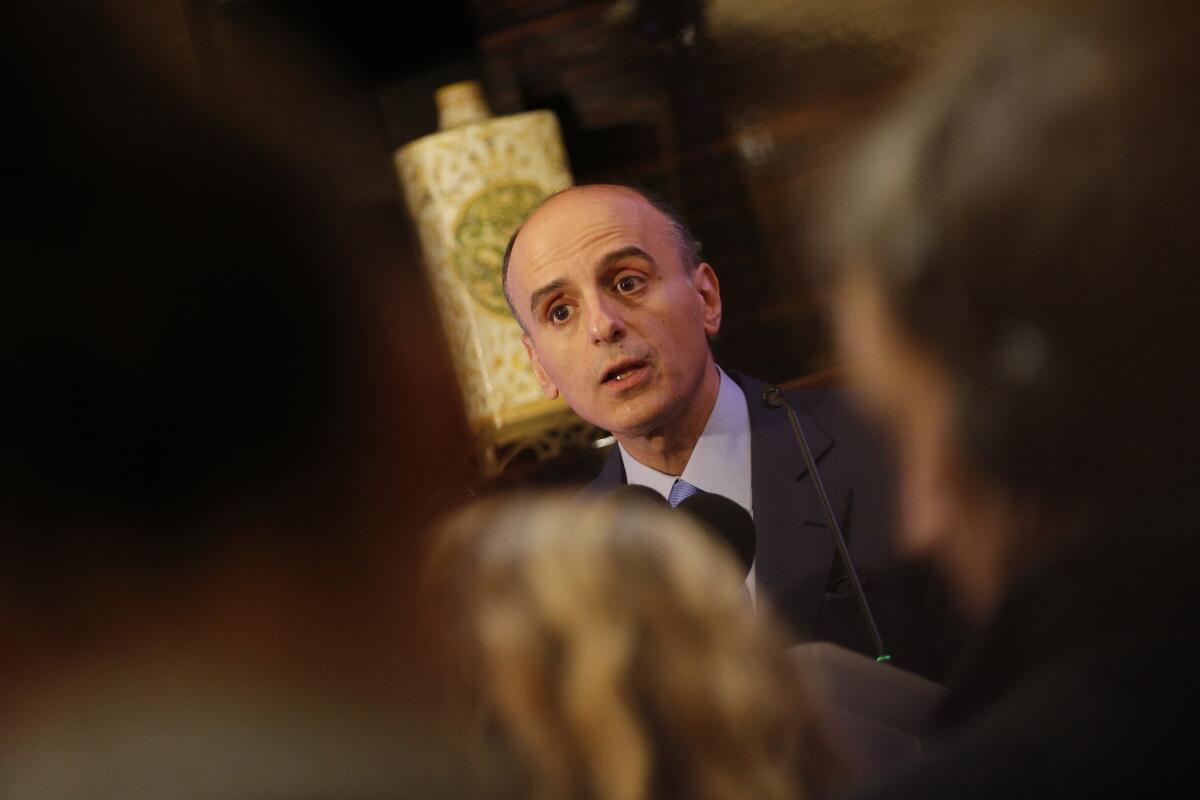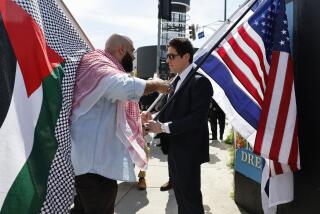Saudi Arabia’s new anti-terrorism coalition stirs questions and controversy
In a region chock full of anti-terrorism coalitions, the newest alliance has managed to raise the ire of countries left out — as well as eyebrows among some named as part of the club.
Saudi Arabia this week declared the formation of an Islamic coalition to combat terrorism, allowing members to “share information and train, equip and provide forces if necessary” for the fight against extremist groups, Saudi Foreign Minister Adel Jubeir said during a Tuesday news conference in Paris.
A statement released earlier by Saudi Arabia named the 34 participating countries, which it said “have decided on the formation of a military alliance led by Saudi Arabia to fight terrorism, with a joint operations center based in Riyadh to coordinate and support military operations.”
“More than 10 other Islamic nations indicated their support of this alliance,” it added.
But several nations expressed bewilderment at being included.
“I was surprised to read the news that Saudi Arabia had named Pakistan as part of the alliance,” said Aizaz Ahmad Chaudhry, the South Asian nation’s foreign secretary, according to a report in Pakistan’s Dawn news outlet.
The news website reported Chaudhry had asked the country’s ambassador in Riyadh, the Saudi capital, to “get clarification from Saudi Arabia on the matter.”
Pakistan, the second name on the list of coalition members, had previously been included in the Saudi-led coalition battling a rebellion in Yemen without its knowledge. It later refused to participate in operations in that conflict.
Malaysia, which was also named as a member, downplayed its role in the alliance.
“There is no military commitment, but it is more of an understanding that we are together in the combat against militancy,” Defense Minister Hishammuddin Hussein told the Star local media outlet.

Saudi Arabian Foreign Minister Adel Jubeir holds a news conference in Paris on Dec. 15 to discuss a new “Islamic military alliance” to fight terrorism.
Nevertheless, he described the country’s inclusion as an honor that “proves the solidarity among Muslim countries in facing terrorist threats.”
In Lebanon, another listed member, the announcement caused rifts in the government, with Lebanese Prime Minister Tammam Salam voicing his support for the coalition even as the Foreign Ministry denied the country would join.
The coalition is “a forward step in favor of all Islamic peoples against terrorism,” Salam said, according to a statement released on the state-run National News Agency. “Lebanon will remain, by its openness, moderation and coexistence principle, a model against terror, extremism and cruelty.”
The Foreign Ministry, on the other hand, said in a statement quoted by the news agency that “what happened tampers with Lebanon’s distinctive position with regard to the definition to fight terrorism and the definition adopted for terror organizations,” in an oblique reference to the Lebanese Shiite Muslim militant group Hezbollah.
“The ministry has by no means received any correspondence or phone call related to the subject of the formation of this alliance.”
Hezbollah, which is heavily supported by Iran, is embroiled in the Syrian civil war and bolstering the flagging troops of Syrian President Bashar Assad. Saudi Arabia sponsors the Sunni Muslim-dominated insurgency against Assad’s rule.
Saudi’s declaration also fanned sectarian tensions in Lebanon’s fractious parliament, whose bickering political parties are largely structured around the country’s 18 religious sects.
Former Prime Minister Saad Hariri, a prominent Sunni politician who is supported by Saudi Arabia, said the coalition was “announced on behalf of the vast majority of Arabs and Muslims that the responsibility to fight the terrorism, which uses Islam as a means to harm Islam, lies on the Muslims,” according to a statement released by his media office.
But other politicians were less enthused.
“Lebanon will not participate in the Islamic coalition ... declared yesterday,” Labor Minister Sajaan Qazzi said in an interview Wednesday with local broadcaster MTV. “Lebanon is neither an Islamic nor a Christian state to join an Islamic or Christian alliance.”
Absent from the list of countries are Iraq and Syria — despite the coalition’s operations being aimed, according to a comments made by Saudi Defense Minister Mohammad ibn Salman on Tuesday, at fighting terrorism in those countries.
“In terms of operations in Syria and Iraq, we can’t undertake these operations without coordinating with legitimacy in this place and the international community,” Salman said at the news conference.
Iraqi lawmaker Hakem Zamili dismissed the new alliance as “sectarian.”
In an interview with Lebanese broadcaster Al Mayadeen, Zamili said that Saudi Arabia, which he accused of supporting the Al Qaeda-affiliated Nusra Front in Syria, “was not serious” in fighting terrorism.
Also missing is Saudi Arabia’s regional rival and Shiite powerhouse Iran, which is pitted against the Saudis in Syria, Iraq and Yemen.
Yet Jubeir, the Saudi foreign minister, dismissed there being any sectarian element to the Islamic coalition’s formation.
“This is not a Sunni coalition or a Shiite coalition,” said Jubeir. “It’s an anti-terrorism coalition and anti-extremism coalition.”
Gen. Ahmad Asiri, spokesman for the Saudi Arabian Defense Ministry, said Iran could join if it “stopped harming Arab and Islamic nations.”
“We are now talking about counter-terrorism operations,” Asiri told the Saudi Arabian daily Al Madinah. “If Iran wishes to join this alliance then it should stop hurting Syria and Yemen, and stop its actions that support terrorism in Lebanon and Iraq.”
Bulos is a special correspondent.
ALSO
U.S. presses Turkey to do more in coalition’s fight against Islamic State
Pentagon chief offers more U.S. firepower to help Iraq fight Islamic State
U.N. nuclear agency formally ends probe of Iran as part of international deal
More to Read
Sign up for Essential California
The most important California stories and recommendations in your inbox every morning.
You may occasionally receive promotional content from the Los Angeles Times.





